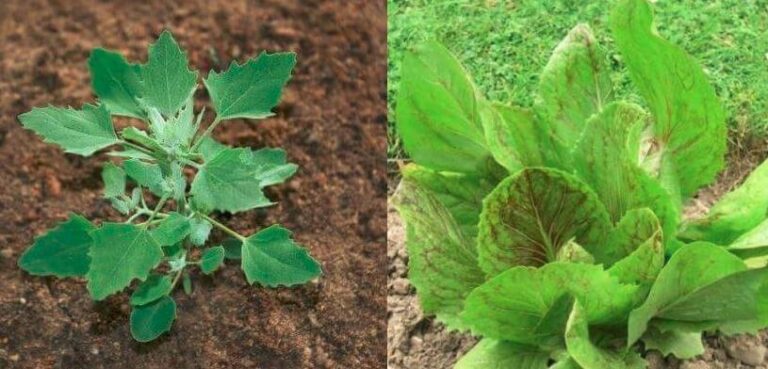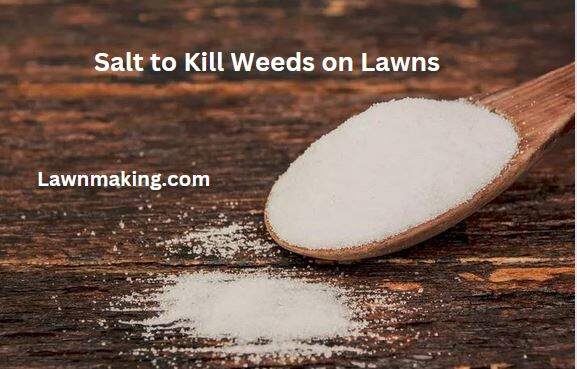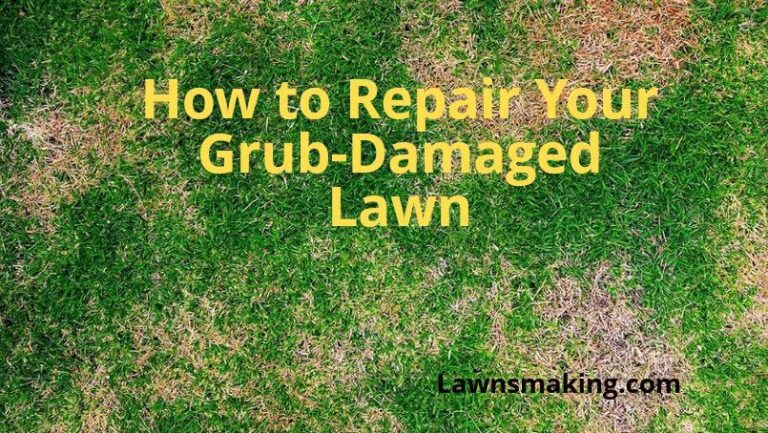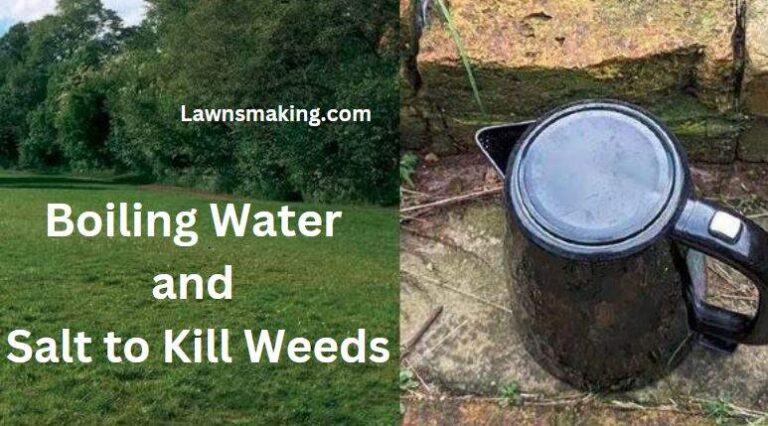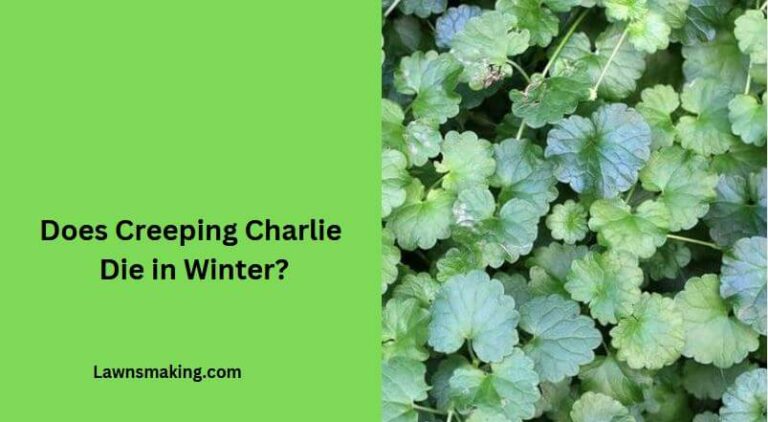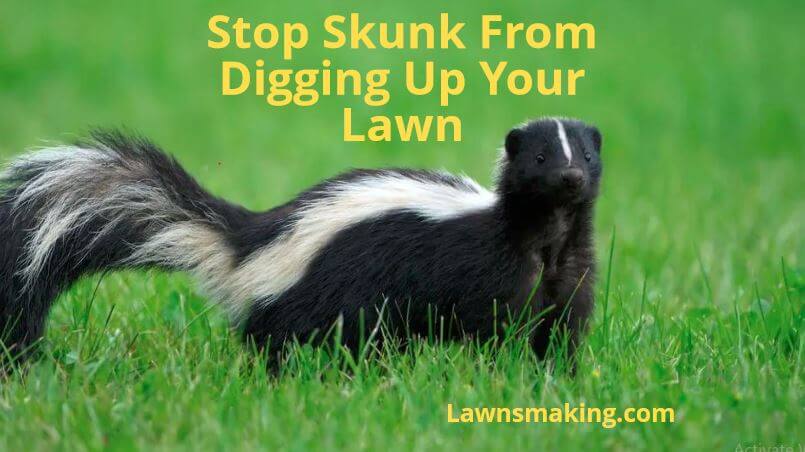
Are you tired of waking up to a war zone of holes and overturned soil in your pristine lawn? Skunks may be cute, but their relentless digging can make your yard messy. With your lawn’s serenity at risk, this thought might have crossed your mind, “How to stop skunk from digging up lawn.”
You can stop skunks from digging up your lawn by removing food sources, avoiding overwatering, and keeping trash secure. The primary motivation of these scavengers is finding easy food, and eliminating potential food sources will make your yard less inviting.
If you’ve ever wondered how to safeguard your lawn from the relentless digging of skunks, you’re in the right place. In this article, I will discuss how to stop skunks from digging up your lawn in 11 easy ways. The practical solutions I provide will help you maintain a skunk-free lawn.
How to Stop Skunk From Digging up Lawn: 11 Easy Ways Explained
Skunks may be adorable from a distance, but it’s time to act when they turn your yard into a minefield of holes. Here are eleven ways to keep these pesky animals away.
1. Remove Food Sources
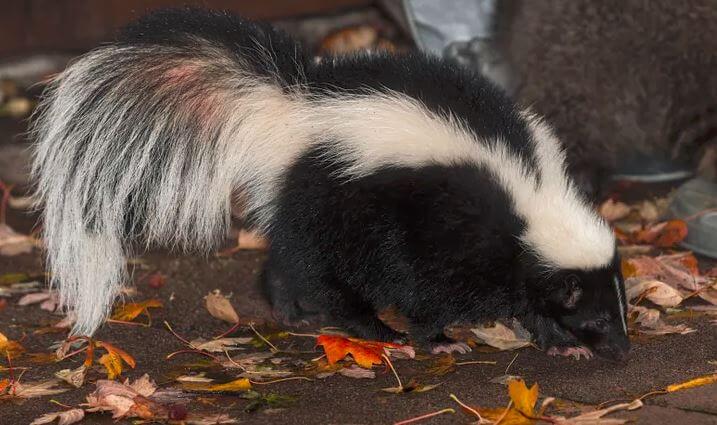
Skunks are attracted to lawns packed with grubs and other insects. Therefore, eliminating these food sources can make your yard unattractive to these annoying animals.
To manage grub infestation, insecticide application or using beneficial nematodes is critical, especially at night when grubs are most active.
According to Oklahoma State University, it’s best to do this during late summer/early fall and sometimes in spring.
Fortunately, there are numerous insecticides and nematode products on the market. However, consider researching and choosing the ones that best suit your lawn.
Additionally, environmentally friendly products will keep your lawn thriving year-round since they will be gentle to beneficial insects and other wildlife.
Lastly, always follow the manufacturer’s instructions for practical and safe application, including donning protective gear.
2. Avoid Overwatering
Soft and moist soil will attract skunks to your lawn, as they prefer easy-to-dig soil.
To keep these animals away, adhere to best practices such as favoring deep and infrequent watering to shallow and frequent ones.
Moreover, excellent soil drainage prevents water from accumulating and making the soil soft, which is unattractive to skunks.
Homeowners with irrigation systems should use timers to control when and how much water is applied to the lawn.
Healthy and well-maintained lawns are less inviting to skunks. Therefore, opt for proper care to enhance resilience against pests.
Also, remember to adjust your irrigation system’s watering schedule during rainy periods, as this will mitigate soil softening.
3. Keep Trash Secure
Skunks scavenge for easily accessible food. Consequently, using bins or trash cans with lids that can tightly seal can make your lawn less unattractive to these animals.
Consider using trash cans equipped with locking mechanisms to prevent skunks from opening them in search of food. You can secure your trash cans using straps or bungee cords if they don’t have lids, as this will deter skunks and other scavengers.
Additionally, prioritize regular trash collection to reduce the time trash sits out. Clean up promptly in case of garbage spills or messes to eliminate any lingering odors that may attract skunks.
It will also help to talk to your neighbors and address the importance of securely sealing garbage bins and trash cans to create a collective effort against skunks in your area.
4. Use Motion-Activated Lights
Being nocturnal creatures, skunks prefer darkness. Motion-activated lights can startle and deter them from entering your yard at night.
Install motion-activated lights strategically to enhance their effectiveness. Generally, placing these lights in areas where skunks are active will do the trick, including entry points.
LED floodlights are ideal for motion-activated lights since they produce bright light and are energy efficient—ensuring your lawn is well-prepared for skunk encounters.
You want the motion-activated lights to come on when skunks are nearby, but not every passing animal. So, adjust the sensitivity of these lights accordingly, and you can use the user manual if you need help to make proper adjustments.
Besides emitting bright light that deters annoying light-sensitive scavengers, LED floodlights will help you with your home’s energy-saving goals.
5. Consider Fencing

Consider fencing, as it is an effective way to keep skunks out of your yard. There are various types of fences available for you to choose from, the most popular ones being:
- Metal fences: Metal fences, such as chain-link or wrought iron, provide a sturdy and durable barrier that can deter skunks from entering your property. Moreover, they are less likely to be damaged by skunks compared to wooden fences.
- Vinyl fences: Vinyl fences are low-maintenance and offer a solid barrier. While they can deter skunks to some extent, they may not be as effective as metal or wooden fences in preventing skunks from digging underneath.
- Wooden fences: Wooden fences can serve as a barrier to skunks, but they may be susceptible to damage if skunks attempt to dig under them
Remember that skunks can jump and climb over barriers. Therefore, ensure your fence is between 6-8ft (1.83-2.44 m) high.
Skunks can dig below exclusion zones, so bury your fence up to 12 inches (30.48 cm) underground to discourage them from digging underneath it.
When selecting your fence, consider aesthetics, durability, and functionality. These considerations will help you choose the suitable material for your fence.
Also, consider how the fence will affect your property’s appearance, allowing you to select a design that complements your landscape.
6. Use Repellents
You can use various repellents to deter skunk activity in your lawn, ranging from commercial ones to homemade remedies like ammonia-soaked cloths.
Each repellent has a recommended application method, the most common ones being;
- Spraying: This method involves applying liquid deterrents, such as hot pepper spray or garlic-infused water, directly onto surfaces or areas where skunks are active
- Scattering: Scattering refers to spreading solid deterrents, such as predator urine granules or mothballs, across the ground or in specific locations where skunks frequent.
- Strategic placement: This approach involves strategically positioning deterrents or repellent materials in specific locations where skunks are likely to enter or cause damage.
Please follow the recommended application method for the specific repellent to guarantee effectiveness.
Additionally, prioritize safety when using repellents, including wearing gloves and following additional safety guidelines provided by the manufacturer.
Periodic re-application of repellents may be necessary to bolster their effectiveness since they may wear off over time or be washed away by rain.
Don’t be shy of experimenting with different skunk-deterring scents. Here are examples of substances you can use to supplement commercial or homemade repellents:
- Hot pepper: Hot pepper spray or powder can be applied to areas where skunks are active. The spicy scent irritates their sensitive senses and deters them from returning.
- Predator urine: Predator urine, like that of coyotes or foxes, can be strategically placed around skunk-prone areas to create the illusion of a predator’s presence, causing skunks to avoid those areas.
- Garlic: Planting garlic in your garden or using garlic spray can create a pungent odor that skunks find unpleasant, deterring them from foraging in the treated areas.
Seeking advice from individuals in your area and researching effective skunk repellents in your region will equip you with facts on which repellents to use in your yard.
7. Use Repellent Plants
Planting repellent plants can help you keep skunks away.
Examples of repellent plants that will deter skunks from your lawn include:
- Marigolds
- Rue
- Alliums
You can increase the effectiveness of repellent plants through strategic planting to create an effective barrier. Strategic planting involves:
- Identifying problem areas
- Selecting repellent plants
- Creating a planting plan
- Planting dense borders
- Strategic grouping
- Interplanting with other plants
- Combining plant types
- Planting near entry points
Moreover, utilizing the concept of companion planting—associating repellent plants with other vegetation— reinforces the deterrent effect.
Regularly care for and maintain your repellent plants to guarantee they remain healthy and effective in keeping skunks away. You can achieve this through:
- Regular watering
- Ensuring the soil is well-drained
- Proper pruning
- Fertilizing as necessary
- Checking for pests
- Mulching and removing weeds
Lastly, planting repellent plants will enhance your lawn’s overall look and serve their practical purpose.
8. Motion-Activated Sprinklers
Skunks don’t like getting wet, making motion-activated sprinklers an efficient and effective deterrent.
Position the sprinklers to serve areas where skunks will likely use as an entry point when entering to dig your lawn.
There are numerous motion-activated sprinklers, and some have adjustable sensitivity and spray patterns.
Consider adjusting the sprinkler’s sensitivity to ensure they activate when skunks approach your lawn or yard.
Also, connect the sprinklers to reliable water sources, such as a garden hose connected to a water supply.
Regularly check and maintain your motion-activated sprinkler system, as this guarantees proper functionality while mitigating blockages and leakages.
9. Remove Attractants
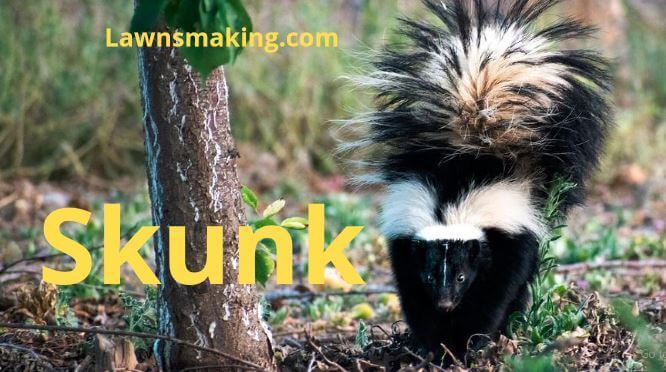
Be vigilant when dealing with what can attract skunks to your lawn, including pet food, fallen fruits, and birdseed.
Storing pet food, fallen fruits, and birdseed in sealed containers or designated bins with lids will deter skunks by preventing easy access.
If you have bird feeders, modifying them and placing them out of reach can help mitigate skunk intrusion. For instance, you can hang your bird feeders from high branches to keep skunks away.
Additionally, pet waste can attract skunks to your lawn due to its potential food content and odor. Consequently, be diligent in managing pet waste to reduce skunk activity in your yard.
Consider training your pets to do their business in designated areas, as this minimizes pet waste on your lawn.
Educate or sensitize family members and neighbors on the importance of responsible pet waste management to reduce skunk activity in your neighborhood.
Lastly, store pet food and waste in sealed containers or designated pet waste disposal systems to contain odors and deter skunks from accessing them.
10. Seal Entry Points
Start by inspecting and identifying potential entry points and areas where skunks may seek shelter. These regions include under porches, decks, or other structures in your yard.
Appropriate sealing materials like wire mesh, hardware cloth, or wood can help you seal off skunk entry points. Ensure you seal the entry points securely, as skunks are persistent.
Follow the steps in installing the hardware cloth underground to prevent skunks from digging beneath the yard’s porch, deck, shed, or other structures. Here are the steps for installing hardware cloth underground to prevent skunks from digging:
- Gathering materials {(1/4-inch or 1/2-inch mesh size), shovel or garden trowel, wire cutters, landscape staples or U-shaped nails, and work gloves.}
- Locating the problem area
- Measuring and cutting hardware cloth
- Digging a trench
- Installing hardware cloth
- Overlapping seams (if needed)
- Securing the top edge
- Covering the trench
- Inspecting and maintaining
- Monitoring skunk activity
Choose the ideal size and material for hardware cloth, ensuring it effectively blocks skunk access.
Regularly inspect and maintain the hardware cloth to confirm it is intact and functional, which will help prevent skunks from breaching it.
11. Secure Compost Bins
Skunks are attracted to compost bins containing food scraps. Therefore, securing your compost bins will discourage their digging.
Consider skunk-proof compost bin options ranging from simple models to those with locking lids.
Opting for compost bins with locking mechanisms and secure lids will contain the compost’s odors while keeping skunks out.
Moreover, follow compositing best practices to make your compost unattractive to skunks and to help break down organic materials faster. So, avoid adding dairy products and meat into your compost bins. Other composting best practices include;
- Balancing Carbon and Nitrogen
- Chopping or shredding materials
- Maintaining proper moisture
- Aerating the pile
- Adding microorganisms
- Layering materials
- Monitoring temperature
- Covering the pile
Regularly turning your compost helps break down organic matter faster and deters skunks from scavenging.
Consider using carbon-rich materials like leaves or straw in your compost bin to control odors, making it less inviting to skunks.
How Do I Keep Skunks Out of My Yard Naturally?
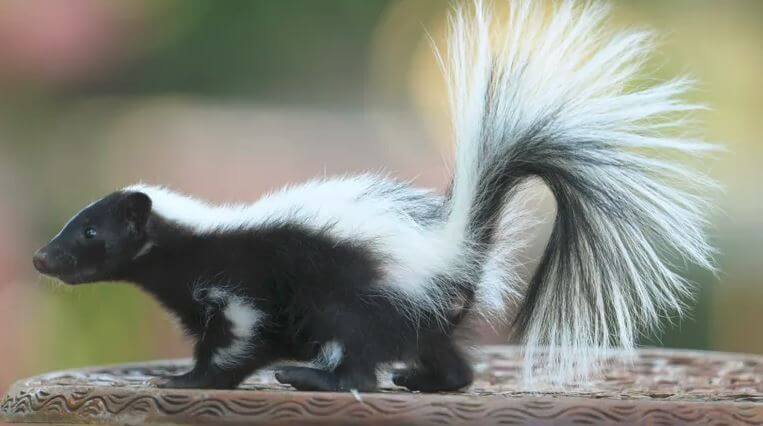
Scattering orange, lemon, and lime peelings near entry points or along the perimeter of your lawn will keep skunks out of your yard naturally. The intense acidic scent of citrus fruits can be overwhelming for skunks, causing discomfort and deterring them from entering an area.
These natural solutions are invaluable to maintaining a skunk-fee outdoor space without resorting to harmful chemicals or traps.
Is Skunk Smell Harmful to Humans?
Skunk smell is not harmful to humans in the sense of causing physical damage or serious health issues. However, if can result to tearing, short-term stinging, and burning if sprayed in the eyes. Breathing skunk smell can also result in lung irritation and exacerbate asthma symptoms.
Fortunately, the side effects of skunk smell on humans are short-term, and with prompt decontamination and proper cleaning, these effects can be minimized or eliminated.
What Is the Best Homemade Skunk Odor Remover?
The best homemade skunk odor remover is a fresh mixture of 3% hydrogen peroxide, ¼ cup baking soda, and 1 or 2 teaspoons of liquid dishwashing soap. The combination of these ingredients creates a chemical reaction that helps break down the skunk odor molecules, making them easier to wash away.
The inexpensive homemade skunk odor remedy will help you contain the unpleasant pungent scent.
Final Takeaway
Preventing skunks from turning your beautiful lawn into a digging ground doesn’t have to be a daunting task. If your biggest concern is “How to Stop Skunk From Digging up Lawn,” the eleven tips in this article will help you protect your yard from skunk invasions and enjoy a pristine, skunk-free lawn for years to come.
Remember, consistency is key, so stay vigilant and implement these strategies as needed to maintain your vibrant outdoor oasis.

